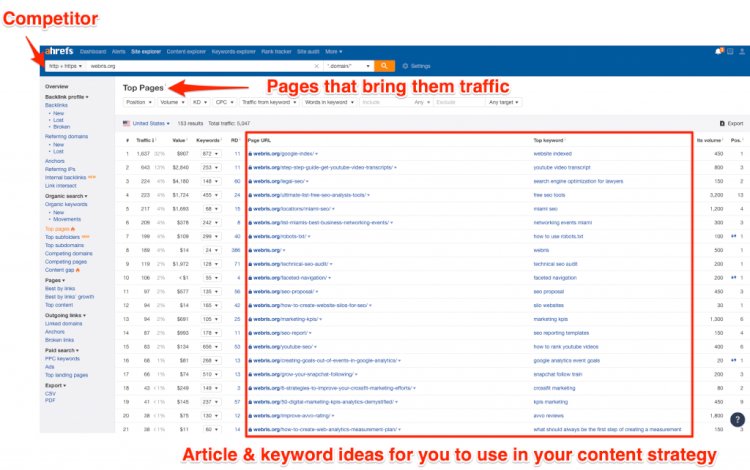PR and SEO: How To Properly Use PR for Maximum SEO Impact

In today’s digital age there is an enormous amount of missed opportunity across marketing channels.
If you have good content (SEO) and good outreach (a form PR), you will be able 10x the results if you improve the synergy between the two.
Public Relations (PR), when properly used, can be a powerful source of:
-
Brand awareness
-
Traffic
-
Website authority
However, many brands overlook this third benefit and are leaving huge amounts of untapped potential on the table.
What Exactly is PR in the Digital Marketing World?
Traditionally, PR is the practice of deliberately managing & improving the spread of information surrounding a brand or organization and the public.
Many brands use PR to control the narrative around their company and direct consumer attention to aspects of the brand they want to highlight – and even direct attention away from potentially damaging aspects.
In the digital marketing world, we like these benefits as well.
However, there is something even more powerful PR can be used for. That something is SEO, specifically link building, to increase website authority (domain rating).
How PR Helps Generate Maximum SEO Impact
Now you are most likely wondering, what can PR and media coverage do to help improve SEO?
The concept is simple: PR generates links & search engines love high-quality links.
Public relation agencies work very hard to get their clients mentioned in the press – web, bloggers, influencers, news, etc. These agencies are not cheap – and the work they do is sometimes very difficult to replicate.
Popular publications will write about your business whenever you send a press release. They will link it to your website, which automatically gives a free backlink to your website.
Aside from that, you will also get the chance to receive brand recognition, which in turn, will boost your brand authority. You can even dedicate an exclusive “As Seen On” section in your website to feature all the publications who wrote a story about you.
Bottom line, when people are looking to avail of a product or service from a new brand, they will most likely search the internet for suggestions. Then, they start looking for reviews and articles about the brand before they make the purchase decision. This is where you should be in.
It is all the more valuable if you know how to get PR and SEO to work together. This is where the missed opportunities begin (do not make these mistakes).
Common Problems & Solutions in Linking PR with SEO
-
Brand mentions in web articles have no links.
Make sure your mentions are hyperlinked.
-
Brand mentions in web articles have links, but the links are marked as “nofollow”.
Make sure your links are marked “dofollow”.
-
Brand mentions in web articles have links, and are “dofollow”, but do not strategically point to pages on the target website that need a link boost.
Make sure you have a strategy around target pages on your website that needs links. Getting links to your homepage is good, but sometimes you want those links going to a page optimized for selling a product or making you money.
-
Not tracking the links you earn.
Make sure you track all your links. Monitor them for uptime, make sure they stay “dofollow”, and build links to those links.
-
Not tracking the traffic and behavior from the links you earn
Make sure you have Google Analytics setup in such a way where you can measure the ROI from your PR campaigns. Quick reality-check question: Are your PR campaigns profitable?
Linking PR and SEO: How to Get Started
To have a successful PR strategy, you must understand your market and position your tactics so the right publications will give you brand coverage that will help you reach your target audience.
The biggest takeaway for all of marketing (and of course your PR and SEO strategy) is this: Understand your buyer, find out where what channels/platforms they are giving their attention to & become omnipresent on those channels/platforms.
If you do this, you will succeed in growing your brand authority in the eyes of the consumer (the traditional goal of PR).
If you do this AND follow the guidelines up above, you will succeed in growing your brand authority in the eyes of SEARCH ENGINES as well.
Once you find these websites, you can implement these four tactics to an effective PR strategy:
PR Syndication Platforms (for SEO)
Warning: This is where the article starts to deviate a bit. You are now crossing over from using REAL PR for SEO, to using SEO PR for SEO (not the same as hiring a publicist or PR company)
There are several PR websites you can join that will connect you with blogs and journalists. The benefit is additional exposure for cheap, and you don’t even have to write content – starting to sound like “SEO” now huh? “SEO” aka little hacks for lazy people who want results.
It’s true. SEO’s are lazy. I stand by it.
Some places to start are: HARO (Help A Reporter Out), PRWeb, and PR NewsWire.
Note – these platforms are really for press syndication and not equivalent to hiring a real PR company to get you legitimate placements. This is “SEO PR” and should be done strategically.
The “aha-moment” for SEO for many people is always this – the key to getting links is exclusivity & barrier to entry. If anyone can pay for a link somewhere it is not that valuable. This is the key difference between PR syndication & a PR company. These syndication sites cost $250-$600 (depending on the package) to get listed on 100s of sites.
Not that big of a barrier to entry.
Whereas hiring a PR company is much more expensive, and they have spent a significant amount of time, energy & resources creating relationships with publishers & media companies where you can get placements – a much higher barrier of entry.
Launch a Campaign for Guest Posting
Guest posting is writing or publishing an article on someone else’s blog or website.
It is one of the easiest ways for you to get free media coverage and links back to your website.
First, you have to look for blogs in your niche that accepts guest posts.
Second, reach out to the editor(s) and pitch a blog post idea to the publication. If your pitch is accepted, write the article and mention your brand in it with a hyperlink to the page you are looking to acquire links for – pretty simple.
It is a win-win scenario. The blog gets a free quality content written for them, while you get a free backlink to your website.
Create an Email Outreach Campaign
There are websites who may write about your brand without you even knowing it. You can take this opportunity to build more links to your website. Be notified whenever you are mentioned by setting up a Google Alert.
Reach out to the publications who mentioned you and send a thank you email. In this thank you email, also ask them to link the article back to your website. They will most likely appreciate you reaching out to them.
Make Use of the Skyscraper Technique
Most websites use the skyscraper technique to build links – essentially this a method of creating high quality content & reaching out to industry relevant websites who are already linking to similar content and asking them to link to you as well.
Ever heard the saying “build a better mousetrap”? Kind of the same thing.
-
Find the content that your competitors are getting their traffic from:
2. Find out who is linking to that type of content already (let’s say for this example we are talking about a piece of content about “search engine optimization for lawyers”
3. Read all of their content and make a more comprehensive & authoritative piece.
4. Reach out to all those “hundreds of websites linking to the top people” and ask them to link to your content as well!
Share
What's Your Reaction?
 Like
0
Like
0
 Dislike
0
Dislike
0
 Love
0
Love
0
 Funny
0
Funny
0
 Angry
0
Angry
0
 Sad
0
Sad
0
 Wow
0
Wow
0

















